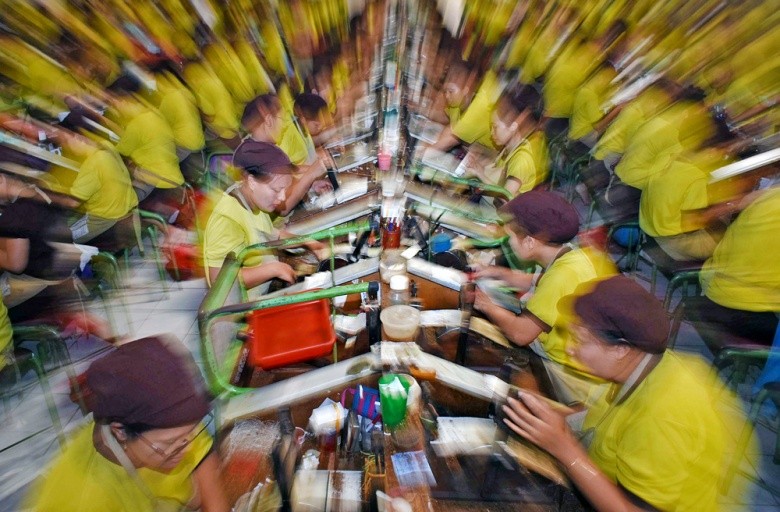Popular Reads
Top Results
Can't find what you're looking for?
View all search resultsPopular Reads
Top Results
Can't find what you're looking for?
View all search resultsManufacturing sees weak rebound as pandemic lingers
IHS Markit’s Manufacturing Purchasing Managers’ Index (PMI) for Indonesia, a gauge of the country’s manufacturing activity, rose to 50.6 points in November from 47.8 a month before.
Change text size
Gift Premium Articles
to Anyone
I
ndonesia’s manufacturing activity improved in November, driven by higher production as factories reopened and demand improved after the lifting of social restrictions. But the risks of deteriorating activity continues to loom with the COVID-19 outbreak remains out of control.
IHS Markit’s Manufacturing Purchasing Managers’ Index (PMI) for Indonesia, a gauge of the country’s manufacturing activity, rose to 50.6 points in November from 47.8 a month before. A value above 50 indicates an expansion against the previous month, while a reading below 50 reflects a contraction.
“The move to transitional PSBB [large-scale social restrictions] measures provided a boost for Indonesia’s manufacturing sector midway through the fourth quarter,” IHS Markit principal economist Bernard Aw said in a statement on Tuesday. "The upturn was largely driven by a record rise in production amid widespread reports of factory reopening and improved demand.”
The Jakarta administration decided to lift its second PSBB in mid-October and move to loosened transitional measures despite a significant jump in virus cases. Indonesia passed half a million cumulative COVID-19 cases on Nov. 23 and has recorded more than 549,000 cases as of Wednesday, official data shows.
The coronavirus outbreak has disrupted business activity, paralyzing the economy and causing millions of people to lose their jobs this year. Indonesia plunged into recession for the first time in two decades as the government struggled to control the outbreak and its economic fallout.
The manufacturing industry contributed around 19 percent to gross domestic product (GDP), the highest among other business sectors, but contracted 6.19 percent in the second quarter and 4.31 percent in the July-September period as a result of cooling domestic and global economic activity.
Manufacturers ramped up production in November compared to the previous month, with output increasing at the fastest rate since the survey began over nine-and-a-half years ago, according to IHS Markit, adding that demand also improved as inflows of new orders rose for the first time since August. The overall expansion, however, was only marginal, it went on to say.
"The subdued upturn in sales and a further marked drop in backlogs of work, suggest that the strong output expansion was connected to manufacturers working through previously placed orders,” Aw added.
“Firms remained reluctant to invest in new capacity and inventories, with factory employment and purchasing activity both contracting at solid rates.”
The survey showed that employment shrank for the nine consecutive months in November while purchasing activity and inventories also decreased.
The survey said greater prices for raw materials and the rupiah’s depreciation drove inflation higher. As a result, manufacturers passed on higher costs to customers through higher charges.
Manufacturers continued to expect output to rise over the coming year, the survey said, citing expectations of a return to normal market conditions.
"The sustainability of the upturn will rely on a more robust recovery in demand,” Aw added.
Separately, Indonesian Chamber of Commerce and Industry (Kadin) vice chairwoman Shinta Kamdani said the manufacturing industry’s trajectory would largely depend on the government’s pandemic response and economic reform through the Job Creation Law.
“We are hoping the expansion will continue should the business environment get better and support spending over the short term,” she told The Jakarta Post on Tuesday. “But we are not certain whether the PMI improvement can be maintained, especially during the continued outbreak.”
The government, she went on to say, would need to restore market confidence by procuring and distributing vaccines once available and push forward with the omnibus law to boost economic outlook and improve people’s confidence to start spending.
“The government’s stimulus will also need to be accelerated to spur economic activity.”
Meanwhile, Bank Mandiri economist Faisal Rachman told the Post that the PMI was the latest sign of economic recovery, adding that the improvement in global economic activity had provided a boost to Indonesia’s manufacturing activity.
“But the rise in coronavirus cases in Indonesia and several major countries could lower global demand for Indonesia’s products,” he went on to say, adding that it would pose a significant challenge to the manufacturing industry and to the GDP in the fourth quarter.
He expects the economy to shrink by around 2 percent to 1 percent in the fourth quarter, which would be an improvement from the 3.49 percent contraction in the July-September period.
“Therefore, the government plays a crucial role in handling the pandemic and implementing a mass vaccination program,” he said. “The government will also need to accelerate stimulus disbursement to support the manufacturing industry and to maintain consumers’ demand.”
The government is expecting to spend Rp 664 trillion (US$47 billion) or 95 percent of the allocated stimulus budget by year-end. It has spent 62 percent of the Rp 695.2 trillion stimulus as of late November.










